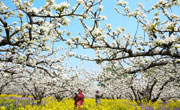Managing individualized physical bookstores is a comprehensive test of ideal, aesthetics, and perseverance
Young people managing individualized physical bookstores is a meaningful thing. It is a comprehensive experience involving one's ideal, aesthetics, and perseverance. It is a journey of both preserving tradition and persisting to innovate. However, it is not an easy task. According to incomplete statistics by "Publisher" magazine, in 2020, at least 30 individualized physical bookstores closed down throughout the country. Yet surprisingly, more than 50 bookstores also emerged and opened new shops. They became spiritual lighthouses for book lovers. During the past year, some bookstores were forced to seek help, and courageously dived into unfamiliar fields to find ways to overcome their problems. Some upheld their attitude and remained firmly concentrated on reading. Other bookstores even grew against the trend.
Nowadays, though online bookstores account for more than half of book retail, the value of physical bookstores is still irreplaceable. Individualized physical bookstores are a unique human landscape, they can open their doors on busy streets, but can also hide in the quiet countryside.
Owning a bookstore remains an ideal for young people of today. In the "2020 Report on Young People's Dream Jobs" by DT Financial, "opening one's own store" was the most popular dream job. The "Report on Small Shop Economic Vitality" also demonstrated 71% of people in the age group between18-50 have plans to open their own stores, where bookstore ranked second among all the choices. Behind statistical figures, every bookstore owner who acted out their ideas is writing a brilliant story.
Wang Wenhai, who is 32 years old, gave up his high-paying job of seven years at an internet company and founded "One Bookstore" in 2018. By integrating “user-oriented” internet thinking, he set up a "membership system" community bookstore. In an experiment called "rescuing young people from 996" (a popular saying about working from 9am to 9pm, six days a week; implying the high pressures young people face in their work), this bookstore let readers use valuable free time to do things that they are personally interested in, and gain back their freedom.
Originated from Wenzhou, Wuliao Bookstore has become a local cultural postcard. Its team is composed of young people born in the 1980s and 1990s, some with PhDs. and master's degrees. They have assembled outstanding young people from various fields, young and full of creativity. During the pandemic, the team actively joined the frontline workers in combating the pandemic. Founder Zhang Xiao, one of the initiators of the "High Temperature Youth" action, took advantage of the strong teamwork from the book club and raised over 10 million yuan of goods and materials to aide national and international pandemic prevention and control.
In every city of the world and in every street corner, we need the spiritual power of bookstores. Can you imagine the look of a city without a bookstore? The desolation is chilling to think of. When online bookstores have become more and more like fast food chains, with the same books trending on the ranking list, the insight and taste of individualized physical bookstore owners are all the more valuable. Every year, these bookstore owners have to pick from millions of publications to find quality works that suit their own taste, and use their physical bookstores to enrich and enlighten the cultural landscapes of different communities and cities.
Individualized physical bookstores that experienced trials and hardships and have become tenacious throughout it all, have lasted not only because of nostalgia. In the long persistence, they explored all the different business possibilities of bookstores. To pass on this light, different generations of bookstore owners strived to expand the boundaries of their commercial activities. At present, individualized physical bookstores are no longer markets for selling books. Thanks to the efforts of young people, bookstores have become public cultural spaces centered on reading. They are continuously being absorbed into the lives of readers, and being integrated into the lives of book lovers.
Writer: Ren Dianshun
[ Editor: JYZ ]










More From Guangming Online
Medics from Fujian leave for Shanghai to aid in battle against COVID-19 resurgence
New int'l land-sea transport service to Indo-China Peninsula launched
Another makeshift hospital under construction in Shanghai
Tourists view tulips in Suiping County, Henan
In pics: blooming gagea flowers on grassland in Zhaosu, Xinjiang
Greek workers stage 24-hour general strike over high prices